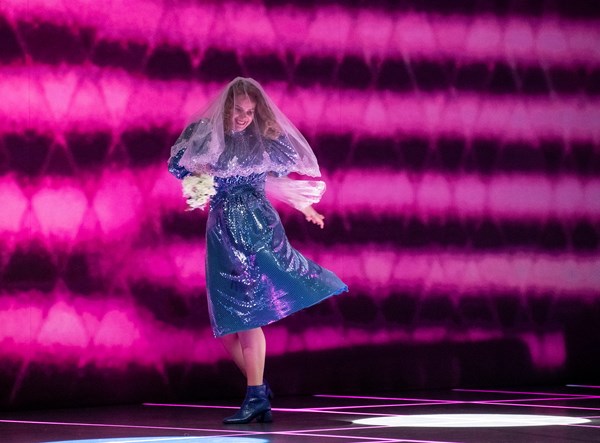Oslo Opera House
Fiordligi – Frøy Hovland Holtbakk
Dorabella – Kari Dahl Nielsen
Guglielmo – Magnus Ingemund Kjelstad
Ferrando – Eirik Grøtvedt
Despina – Eldrid Gorset
Don Alfonso – Audun Iversen
Maja Ravn (designs)
Åsa Frankenberg (lighting)
Norwegian National Opera Chorus
 |
| Image: Erik Berg |
Visiting Oslo for a conference, I was eager to go to the opera if possible, which meant the second night of Katrine Wiedemann’s new production of Cosi fan tutte. Oslo Opera House is just as spectacular a building, setting included, as the pictures would have it. It is beautiful inside too, Norwegian oak trees put to good (I hope sustainable) use in the auditorium, its acoustic as warm as it is clear.
What, then, of the production and performances? Wiedemann’s central idea seems to me a reasonable one, nothing especially out of the ordinary in terms of an essentially contemporary context, but is ultimately let down by certain details that detract and distract. The central concept is of two young couples starting their lives together, visiting an IKEA store to begin to furnish their new homes (which may be next door to one another, or perhaps that is simply a way of showing them both onstage at the same time). Don Alfonso, the older, wiser employee has seen it all before and decides to put them to a test—just as one would expect. As the drama progresses through the day Guglielmo and Ferrando are bound to follow his directions, we see various urban landscapes—including, puzzlingly, a backdrop that looks far more like a London than an Oslo street—broadly to accompany the time of day: so a trip to a supermarket (or, oddly, a research library), to a night club, and so on. Neither of the oddities mentioned so far especially matters, but they seem typical of a concept that has not really been through, or at least comes across as not having been so.
The biggest problem, however, lies in the male lovers’ disguise. I initially thought I must be misunderstanding, so unlikely was it that a director would choose to portray then as homeless people. Perhaps this was a local ‘look’ that I was not aware of, or something. But no, disguised in ‘unwashed’ state, they meet Fiordiligi and Dorabella at a metro station, and matters proceed from there. There is no discernible social or political comment here, but various sets of possible implications, none of which it is possible to spin in a non-offensive way. This, I am afraid, needs rethinking, for the fundamental idea of an assembly-kit life, thrown by Don Alfonso’s intervention, has merit to it and surely deserves a better chance, even if the designs are themselves a bit too ‘flat-pack’ for comfort.
The performances, too, deserve better. A young cast, bar Audun Iversen’s welcome voice of experience as Don Alfonso, threw itself into the intrigue with laudable commitment and considerable results. Frøy Hovland Holtbakk as Fiordiligi and Kari Dahl Nielsen as Dorabella both had the coloratura and knew what to do with it, as well as the ability to spin a fine Mozart line. Loss of one of his arias notwithstanding – this Così was cut to a considerable, even surprising extent – Eirik Grøtvedt tired a little in the second act, but otherwise offered a nicely sung Ferrando. Magnus Ingemund Kjelstad’s Guglielmo was for me the pick of the bunch, his Guglielmo as beautifully sung as it was an animating stage presence. Eldrid Gorset’s Despina was also excellent, without any of the irritations that can sometimes, sadly, accompany performances of the role.
Tobias Ringborg led the house orchestra in a sensitive, stylish performance—at least beyond an Overture that was both pulled around and hard-driven (all too common in current ‘period’-style Mozart). That the score was thoroughly in Ringborg’s head could be heard as well as seen; whether I agreed with every tempo decision or not, there was always evidence of consideration. It was a pity we did not hear more of the work, but I doubt that was his decision. Quite why, though, the chorus was relegated to tape I do not know: another strange choice on the director’s part, I presume.